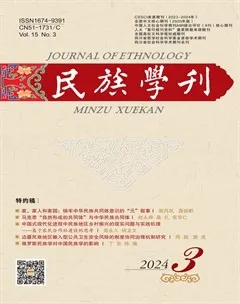Convergenc
2024-10-12HuLiang
JOURNAL OF ETHNOLOGY, VOL. 15, NO.03, 104-114, 2024 (CN51-1731/C, in Chinese)
DOI:10.3969/j.issn.1674-9391.2024.03.012
Abstract:
Anthropologists hold diverse and ambivalent attitudes towards big data. Some of them believe that traditional ethnographic fieldwork still should dominate anthropological methods, therefore viewing large-scale data collection and analysis as merely complementary to qualitative research.
This paper holds that clarifying the relationship between big data and anthropological ethnography can be of great significance for advancing anthropological methods. Therefore, this study tries to explore the convergence of big data technology and anthropological ethnography across three key dimensions: Ontology, epistemology, and methodology. In ontology, big data scientists and ethnographers jointly focus on reframing new “realities” as represented by big data. In epistemology, attention is paid to how knowledge definitions are evolving, driving the personalization and diversification of knowledge. In methodology, the fusion of big data with traditional ethnographic methods has led to the development of enhanced ethnography, online ethnography, and offline ethnography, promoting innovation and expansion in ethnographic research methods and scope, and introducing new perspectives and approaches for understanding social and cultural phenomena.
However, big data also presents challenges to anthropological ethnography, particularly concerning technological dependence, data saturation, and ethical privacy concerns. Researchers may excessively rely on technology, neglecting the humanistic aspects inherent in data, potentially rendering research impersonal and mechanistic. Additionally, researchers face data overload and the selection difficulties of relevant information. Furthermore, key problem-solving strategies in big data analysis may affect the objectivity and accuracy of research, overlooking contextual influences on data interpretation. Ethical and privacy issues also seem to be looming large, with such issues as individual privacy rights as well as a growing prominence of controversies surrounding data ownership and misuse. Moreover, big data may introduce biases, underrepresenting the voices of marginalized and minority groups, exacerbating the digital divide issue.
In response to these challenges, this study believes that anthropological ethnography needs adopt a cautious approach to integrating big data technology. Anthropologists could address these challenges by focusing on “thick data” and simultaneously valuing “small data.” Firstly, adopting the principles of “thick description” and “thick data,” emphasizing in-depth, qualitative data to uncover the motives and cultural backgrounds underlying human behavior from diverse perspectives. Simultaneously, valuing “small data,” namely micro-level data generated by individuals or groups, could help identify patterns and phenomena from an intensive and comprehensive perspective, ensuring research depth and accuracy. Regarding ethical issues and privacy security, researchers should ensure informed consent and privacy protection, prioritize ethics education and training, establish independent ethics review processes, promptly respond to participants’ feedback and concerns, and safeguard participants’ rights and research legitimacy.
In conclusion, the above confirms the prevailing notion that the advent of big data expands the scope and tools of ethnographic research, promoting the integration of digital ethnography with big data. This development trend requires ethnographers to be more flexible, pay attention to interaction with technology and interdisciplinary cooperation to adapt to and leverage emerging digital research tools innovatively. Currently, anthropological research in our country also needs to integrate qualitative and quantitative methods, learn to use digital tools, while at the same 4eJtKXeToT+kZv0J3FOxOA==time exercise caution regarding technological dependence and data overload Overall, anthropological ethnography methods in the era of big data demands a balanced integration of traditional methods and modern technology to more comprehensively and deeply understand and interpret social and cultural phenomena.
Key Words:
big data; big data technology; anthropological ethnography; virtual ethnography; “thick data”; “small data”
杂志排行
民族学刊的其它文章
- An Ethnographic Textual Analysis of Xiyu Wenjian Lu
- The Chinese Identity in the Creation Mythology of the Yi People
- The Evolution of Chinese Anthropology’s Overseas Ethnography from A Knowledge Network Perspective
- Influence of Russian Ethnology on Chinese Ethnology
- Foundation
- The Construction of Evaluation Indexes for Teachers in Minzu Colleges and Universities Using Student-Centered Approach
